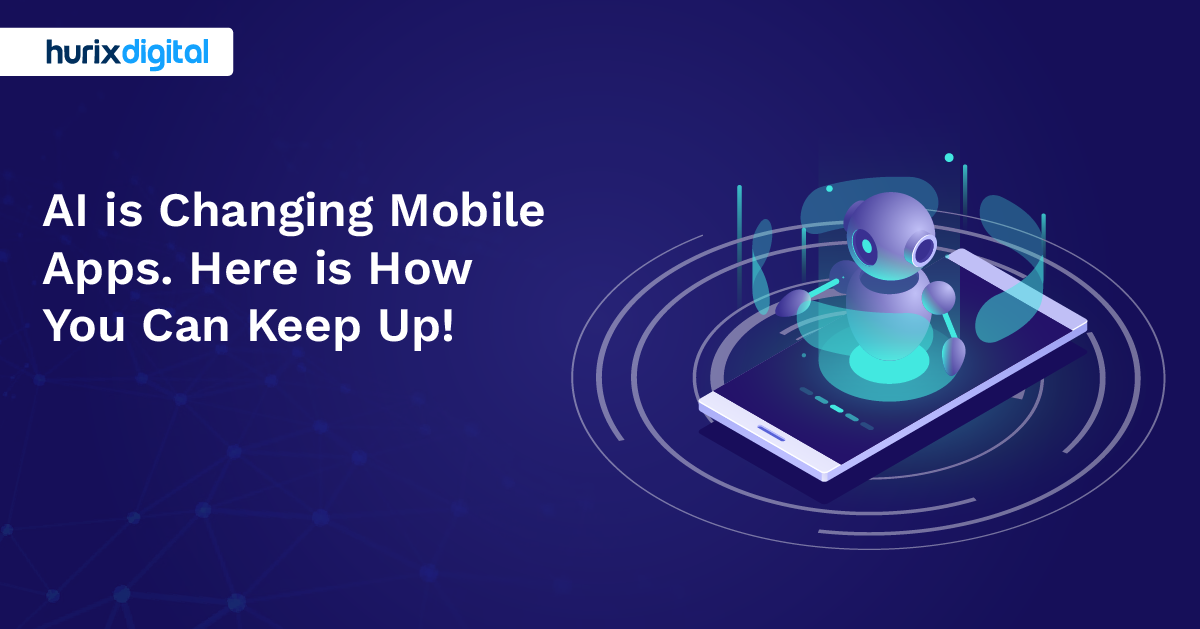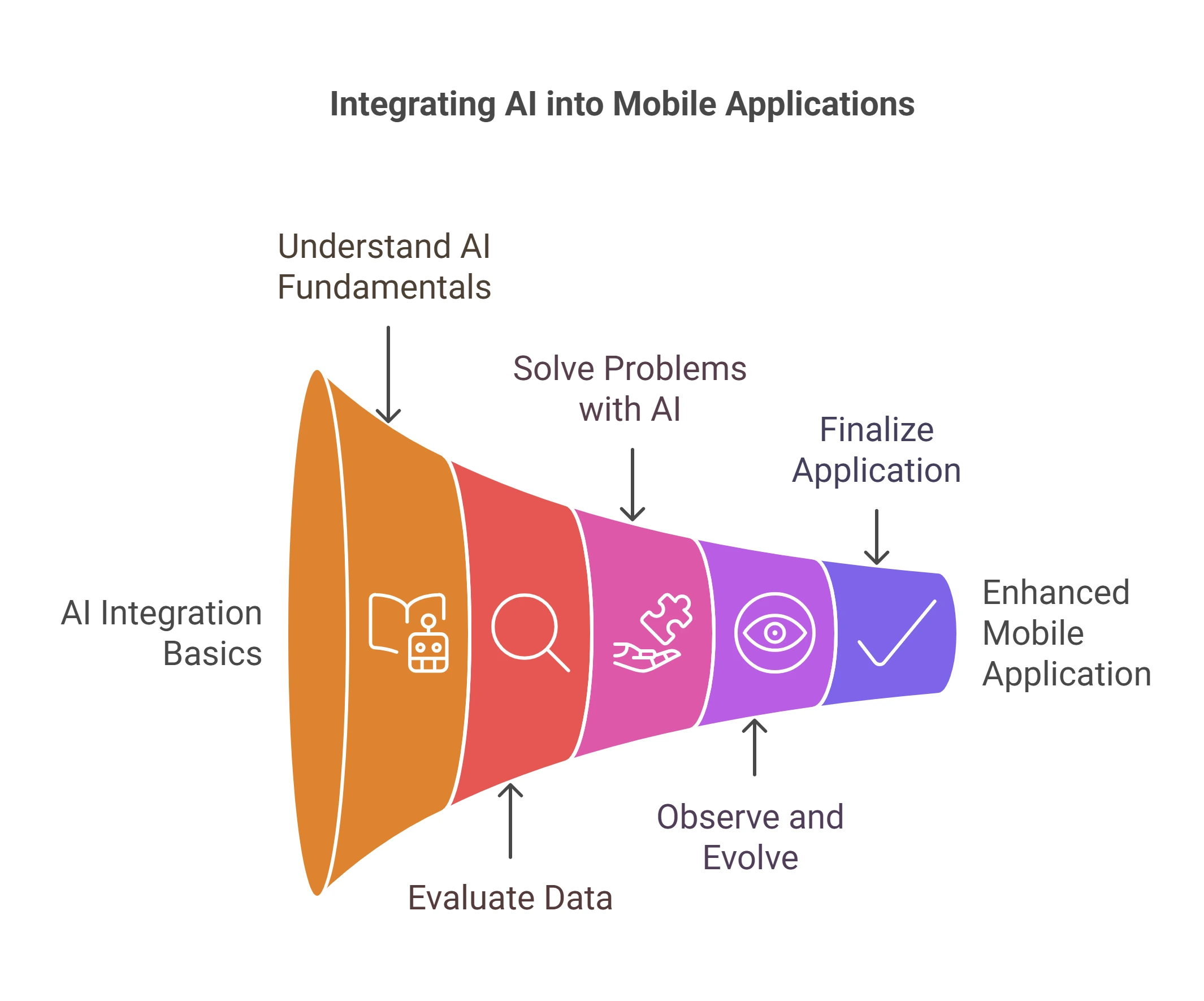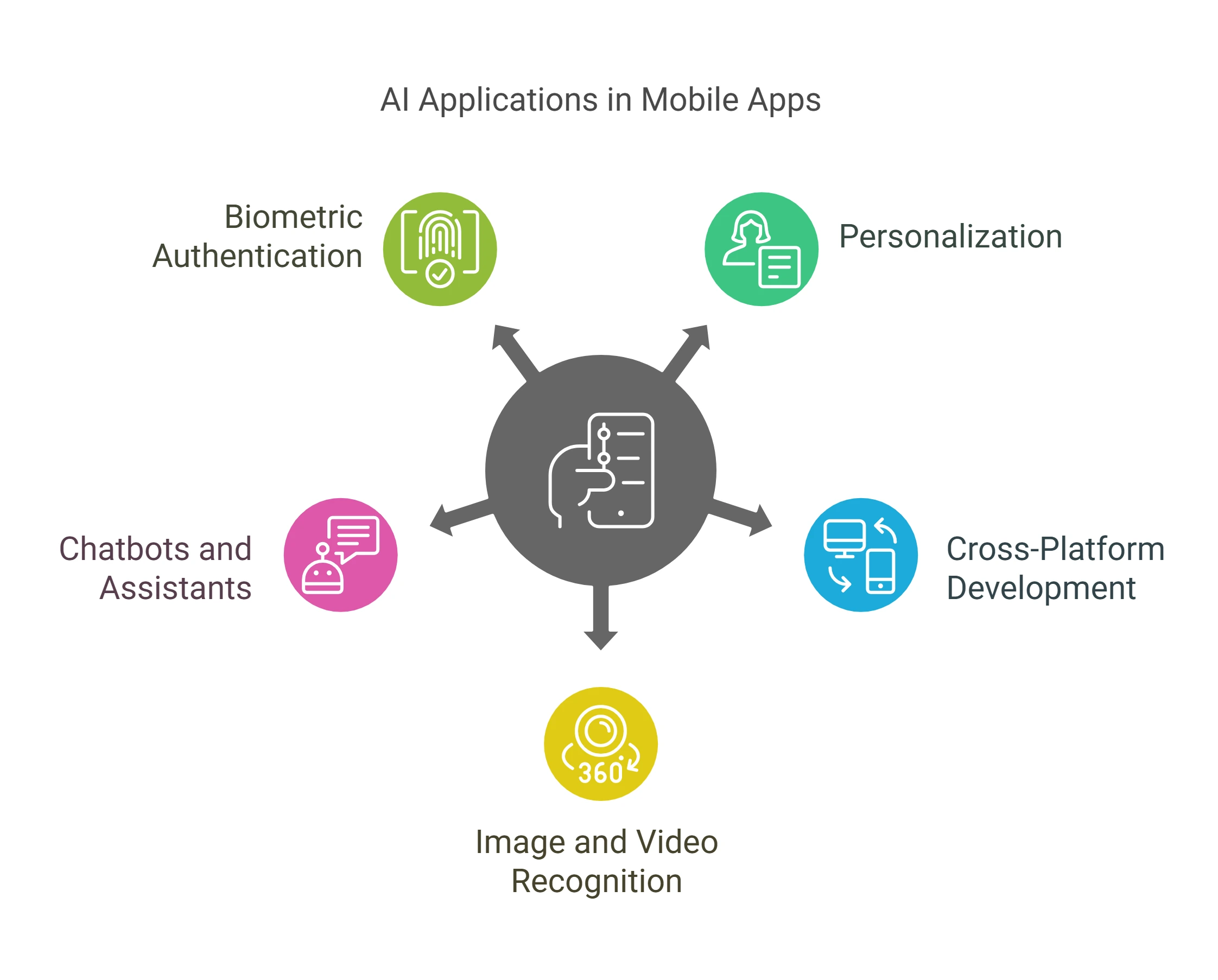
AI is Changing Mobile Apps. Here is How You Can Keep Up!
Summary
AI is revolutionizing mobile app development, making apps smarter, more secure, and highly personalized. From automation to biometric authentication, AI enhances efficiency, user experience, and security. Discover the latest AI-driven trends, best practices, and how Hurix Digital can help you build next-gen mobile applications.
With people relying on their smartphones more than ever before, mobile app development solutions have been looking for ways to streamline app development. With an ever-increasing demand for more feature-rich and complex requirements, they found their answer in artificial intelligence.
This blog will dive into ways AI in mobile app development is growing and highlight best practices on how to use it effectively.
Table of Contents:
- What Exactly is AI Mobile App Development?
- 5 Steps to Follow While Integrating AI into Mobile Application
- Innovative Ways to Use Artificial Intelligence in Mobile App Development
- Takeaway
What Exactly is AI Mobile App Development?
AI mobile app development is the process of creating apps that use artificial intelligence (AI) to provide smart, adaptive, and personalized features and functionalities to users.
Unlike traditional app development, which relies on predefined rules and logic, AI mobile app development leverages machine learning, deep learning, and other AI techniques to enable apps to learn from data, user behavior, and feedback, and to improve themselves over time.
AI mobile app development is the future of app development, as it can help create apps that are more engaging, immersive, and intelligent, and that can cater to the diverse and dynamic needs and preferences of users.
- Faster and More Efficient Development Process: Using AI can help developers automate and optimize various tasks, such as coding, testing, debugging, and deploying apps, saving time and resources.
- Higher Quality and Performance of Apps: AI can help apps deliver better user experience, functionality, and reliability, by providing features such as voice and face recognition, natural language processing, image and video analysis, and more.
- Enhanced Security and Privacy of Apps: AI apps protect user data and prevent cyberattacks, by using techniques such as encryption, authentication, anomaly detection, and more.
- Reduced Costs and Risks of App Development: By using AI, developers can reduce the costs and risks of app development, by providing insights, recommendations, and solutions for various challenges, such as user demand, market trends, app performance, and more.
5 Steps to Follow While Integrating AI into Mobile Application
The process of integrating AI into your mobile app development is similar to other software implementations, however, it certainly has its nuances, which are important to consider for a favorable outcome.
1. Starting with the Fundamentals of AI Technology
The first step is to understand what AI technology is and its popular techniques used in various mobile apps, such as:
- Image recognition technology
- Voice recognition technology
- Chatbots
- Emotion recognition technology
- Biometrics
- Machine learning
- Text recognition technology, etc.
Then, you need to assess the day-to-day problems faced by users and how AI will help in solving these problems. Identifying and prioritizing these issues will allow you to avoid implementing unnecessary and overwhelming features, reducing your cost and making your app easy to develop and use.
Remember, before you make your app or hire mobile app development services, you must have a clear goal in mind.
2. Evaluating the Data
Analyzing and evaluating the collected data will largely affect the quality of your mobile app. Hence, it is a crucial step in mobile app development. Based on this, you can predict user behavior and offer personalized services to each user.
Using machine learning AI technology, which makes use of algorithms like regression and neural networks, as used by Netflix and Amazon, you can enhance the quality of your services. This will also help in detecting fraud in real-time in the finance industry.
Thus, with the help of AI, you can make apps to gain a competitive edge in the market.
3. Solving the Problem Using AI Technology
This is the most critical step in mobile app development. After identifying the issues customers face and evaluating the collected data carefully, you can now develop a custom AI app development model for your mobile app or use various pre-existing AI tools.
If you are using third-party tools to fetch data from other sources, you’ll have to implement APIs (Application Programming Interface) or turn to custom integration technologies.
It largely includes using the expertise of AI engineers and developers, as the process of integrating third-party tools is complex and time-consuming.
4. Observing and Evolving
After implementing the solution, it is necessary to see if it can solve the user’s problem effectively. You must also get feedback from the customers. It will help you to make the required changes and will improve the performance of your app.
You should also keep a tab on the metrics and make changes promptly to adjust the algorithm or any other part of the AI component. For better and refined performance, it is essential to measure and reduce model latency, traffic, and costs by code and infrastructure optimizations.
Refining your mobile app with the help of AI technology will benefit you by gaining a competitive edge in the market.
5. Give a Final Touch to Your App
After successfully integrating AI into your app and making the necessary optimizations to refine it, you will be able to deliver simple, safe, and intelligent solutions. Just keep in mind a few things, such as:
- As training data is the backbone of AI, curate quality training data for accurate results.
- Regularly test the model on new data and re-train to continue achieving high precision.
- Make sure that the user data is anonymized, encrypted, and stored securely. Additionally, authentication protocols should be implemented to ensure that only authorized users can have access to it.
Innovative Ways to Use Artificial Intelligence in Mobile App Development
Artificial Intelligence is making significant inroads into mobile app development by transforming the way users interact with their devices and enhancing the capabilities of applications.
Following are the top five ways in which AI is paving its way into the mobile app development landscape:
1. Personalization and Recommendation Engines
Artificial Intelligence in mobile apps plays a pivotal role in enhancing user experiences through personalized content and recommendation engines. AI algorithms analyze user behavior within the app, including preferences, interactions, and historical data. By understanding individual user patterns, mobile apps can tailor content and recommendations to suit the user’s preferences.
A great example of this is e-commerce apps that utilize AI to analyze users’ purchase history, browsing behavior, and preferences to provide personalized product recommendations.
Similarly, streaming apps utilize AI in app development to analyze listening or viewing habits and recommend music, videos, or playlists that align with the user’s preferences. Recommender systems use machine learning algorithms to suggest products that align with the user’s tastes and needs.
Furthermore, AI-backed recommendation engines power personalized push notifications, delivering relevant updates, promotions, or alerts based on user preferences and behavior. Personalized notifications increase the chances of user interaction and app retention.
2. AI in Cross-Platform App Development
AI is a game-changer in cross-platform mobile development as it streamlines the entire process and improves user experiences. With machine learning-based code generators, AI simplifies the development cycle by automating code generation and optimization and significantly reducing time for cross-platform app development.
Secondly, predictive analytics and natural language processing (NLP) powered by AI enable personalized experiences. This includes adapting the app’s interface and features to user preferences across platforms.
Furthermore, AI-driven tools facilitate compatibility testing and ensure a smooth user experience on different devices. Dynamic user interface adaptation tailors visuals to various screen sizes, while AI aids in cross-platform communication and synchronization.
Lastly, security measures are strengthened through AI as it detects and responds to threats in real-time based on user behavior patterns. Moreover, automated updates and maintenance ensure the seamless deployment of features and security patches across diverse platforms.
3. Image and Video Recognition
AI technology is reforming image and video recognition in mobile apps, bringing about significant advancements in various industries. AI algorithms are often based on convolutional neural networks, which can detect and classify objects within images or video frames.
Mobile apps utilize these algorithms to identify and label objects and enable functionalities such as augmented reality, product recognition, and content categorization.
In addition to this, AI-powered facial recognition technology is employed in mobile apps for user authentication, security, and personalized experiences. Mobile devices can use facial recognition to unlock the device, and apps can utilize this technology for user verification.
One of the many applications of using AI in app development is that AI algorithms can interpret gestures captured through images or video frames, enabling users to interact with mobile apps through hand movements. This technology finds applications in gaming, virtual reality, and user interface design.
4. Chatbots and Virtual Assistants
AI technology is bringing forth a new era of intelligent and interactive user experiences with chatbots.
NLP allows virtual assistants to interpret user input in a manner that depicts natural conversations. Intent recognition further refines user interactions by enabling chatbots to discern the purpose behind user messages for more accurate responses.
Lastly, context awareness enables them to maintain continuity in conversations by understanding the user’s past interactions and responses, creating a more cohesive experience.
Beyond text-based interactions, AI extends the capabilities of chatbots and virtual assistants into the world of voice recognition, supporting voice commands and enhancing accessibility through hands-free interactions. Task automation is another facet that enables these intelligent assistants to automate routine tasks like setting reminders or fetching real-time information.
Finally, with the evolvement of AI applications in mobile, the security of such virtual assistants is enhanced through biometric authentication and voice recognition which ensure a secure and personalized experience for users engaging with chatbots and virtual assistants in mobile apps.
5. Biometric Authentication
Biometric authentication, powered by AI, is transforming the security paradigm of mobile apps by implementing methods such as facial recognition, fingerprint scans, and iris authentication. These biometric techniques offer solid and secure means of verifying user identities, significantly reducing the risk of unauthorized access to mobile devices and apps.
Furthermore, AI’s expertise in behavioral biometrics further elevates mobile app security by creating unique user profiles based on individual behavior patterns. From typing speed to touch gestures, this approach adds a layer of authentication. It ensures that even if traditional credentials are compromised, the behavioral biometric signature acts as a personalized safeguard.
The incorporation of secure data encryption, real-time monitoring, and response mechanisms further cements the role of AI in mobile app development. Through these multifaceted approaches, AI empowers developers to create more resilient and adaptive security measures to ensure the integrity of sensitive user data in mobile apps.
Takeaway
By reducing human intervention, AI technology helps mobile app developers to complete monotonous tasks quickly. It also allows them to invest their time in doing something important and solving real-time issues. Thus, it increases their efficiency, which, in turn, leads to greater self-satisfaction.
Thus, implementing AI technology in your mobile app is the need of the hour. Mobile apps need to stay ahead in technological advancements in the competitive market, continuously innovating and evolving.
Hence, hiring a reliable mobile app development service is the answer to all your problems. Hurix Digital is one such company that has the experience and expertise required to deliver a top-notch mobile application using AI in mobile app Development, which is crucial for your success. It is one of the most trusted companies in the market to build a sophisticated and highly functional app with numerous features.
So, give us a call now and get started today!

Currently serving as the Vice President of Technology Delivery Operations at HurixDigital, a prominent global provider of digital content and technology solutions for publishers, corporations, and educational institutions. With over 16 years of experience spanning EdTech and various domains, I hold certification as a SCRUM Product Owner (CSPO). My expertise includes operations, finance, and adept people management skills.





